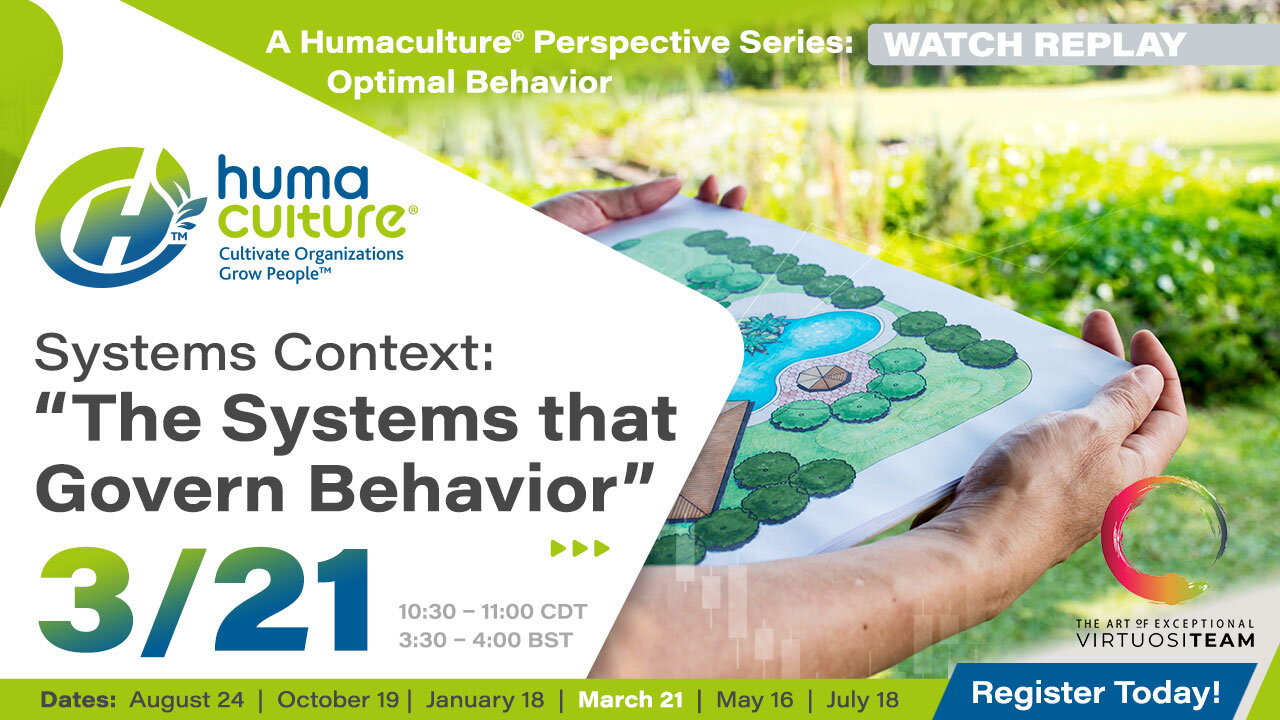Premium Only Content

Optimal Behavior: Systems Context: “The Systems that Govern Behavior”
Watch a replay of the fourth webinar in Humaculture, Inc.'s “Optimal Behavior: Making Optimal Behavior the Natural Choice” to learn why and how the Systems employed in an Organization impact performance and well-being and how they can be used to grow capabilities, inspire motivation, overcome barriers, and resist temptations to lead to Optimal Behavior.
PRESENTERS
• Steve Cyboran, ASA, MAAA, FCA, CEBS, actuary and strategy consultant
• Wes Rogers, Humaculturist® and strategy consultant
• Colin Bullen, ASA, behavior change actuary
• Hanlie van Wyk, behavior change consultant
OBJECTIVE
In this fourth session in our series on Optimal Behavior, we explore how the Systems context influences behavior and change. To be able to evolve towards Optimal Behavior, people need to be surrounded by Systems that support them on their journey. The Systems context contains all the tools and guidelines that help us on our way every day. In the workplace these are policies and procedures, enterprise resource management Systems, pay, benefits, and rewards, as well as that curious thing we often refer to as “the way we do things around here.” Anything that signals the optimal way to behave in each Organization. If any of those Systems are misaligned with the Optimal Behavior you’re trying to achieve, your change efforts will fail. The Organizations that recognize this know how to adjust those Systems, including when to bring things into the public eye and when to keep them quiet. They will also be aware that rewards for engagement need to drive intrinsic motivation if the Organization is to develop optimal habits that last.
“A bad system will beat a good person every time.” – W. Edwards Deming
KEY TAKEAWAYS
Join us to learn:
• How ineffective Organizations employ Systems that:
- Limit growth and development
- Lead to discouragement and apathy
- Create unintended barriers or temptations
• How effective Organizations:
- Build habits into processes
- Provide meaningful rewards built on recognition and appreciation
- Balance private correction and open dialogue
-
 UPCOMING
UPCOMING
Grant Stinchfield
1 hour agoMy Trip To The Emergency Room Exposed the Our Joke of a Health Care System
87 -
 LIVE
LIVE
RyanMatta
1 day agoOPERATION AMBER ALERT | CHILD TRAFFICKING DOCUMENTARY | EXECUTIVE PRODUCER RYAN MATTA
332 watching -
 14:14
14:14
TimcastIRL
1 day agoJoe Rogan ROASTS The View For Saying He BELIEVES IN DRAGONS In HILARIOUS MOCKERY
41.7K70 -
 2:17:04
2:17:04
Side Scrollers Podcast
5 hours agoDoc Disrespect ON RUMBLE, PlayStation To Rival Nintendo | Side Scrollers
17K3 -
 12:04
12:04
Silver Dragons
2 hours agoGAME CHANGING NEWS FOR SILVER
163 -
 49:43
49:43
Ben Shapiro
2 hours agoEp. 2092 - Trump Makes His FINAL PICKS
34.1K25 -
 1:06:49
1:06:49
Russell Brand
4 hours agoIs Elon Musk Taking Over MSNBC?! + Trump's Executive Order Plan – SF500
113K198 -
 1:57:39
1:57:39
The Charlie Kirk Show
3 hours agoThe Fake Tulsi Smear + Is Canada a Free Country? (No) + Why Trump Is Winning | Mullin | 11.25.24
81.1K25 -
 27:42
27:42
Stephen Gardner
3 hours ago🔥Blackmail Scheme ROCKS Trump's RFK Pick!
39.3K38 -
 59:57
59:57
The Dan Bongino Show
7 hours agoGeraldo Wants To Fight Me Again? (Ep. 2377) - 11/25/2024
752K2.77K